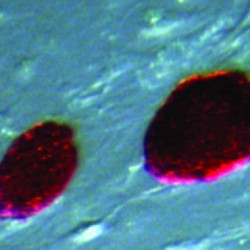By Helen Figueira
February 4, 2009
Time to read: 2 minutes
 DNA-binding protein important for correct neural development
DNA-binding protein important for correct neural development
The RE1-silencing transcription factor (REST) is a DNA binding protein that blocks the expression of neuronal genes in non-neuronal cells. Its abundance in embryonic stem (ES) cells led to speculations that REST may serve a specific function in these cells. ES cells have the ability to turn into any cell type in an organism (a property called ‘pluripotency’) and one idea was that REST could act as a repressor of lineage determination: the point when the ES cell’s fate – its role as a specific tissue type – is decided.
Work published last year in Nature suggested that REST is important to maintain the pluripotency of ES cells. They described that an ES cell line missing a single REST allele expressed reduced amounts of pluripotency-associated genes and that they exhibited lower activity of alkaline phosphatase – a stem cell marker.
Now, a team of researchers in the CSC’s Lymphocyte Development group, led by Amanda Fisher and Matthias Merkenschlager, is to publish a paper in Nature that refutes this claim, demonstrating that REST is not required for maintaining ES cell pluripotency.
In a series of experiments using two complementary methods of gene targeting and RNAi knockdown, lead investigator Helle Jørgensen and co-workers showed that mouse ES cells that lack or have reduced REST levels still produce normal amounts of the pluripotency protein Oct4 and have similar alkaline phosphatase activity as cells with normal REST function.
In a companion paper in the journal Development, the team examined the function of REST in ES cells in detail. By genome-wide expression profiling, they found that a subset of potential REST target genes are incorrectly expressed in ES cells lacking REST. This, however, did not appear to have physiological consequences, as the cells did not show any tendency to spontaneously differentiate towards a neural lineage and were functionally indistinguishable from normal cells.
While these studies found that REST is not required to maintain ES cell pluripotency, or indeed to prevent neural differentiation, the findings show that REST may be important for correct neural development. This would be in line with earlier research showing that mice lacking REST have complications in embryonic gestation that result in forebrain malformation and death.